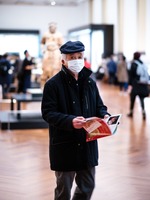There's science and then there's culture - how we respond to science
 “Why is no-one wearing a mask? This room is full of people. We know this virus is in Sydney. Why aren’t you all wearing masks?”
“Why is no-one wearing a mask? This room is full of people. We know this virus is in Sydney. Why aren’t you all wearing masks?”
The Chinese student’s frustration was evident and the expert panel regarded her sympathetically. The moderator passed the question to the University Vice Chancellor.
“Well there’s science” he said, "and then there’s culture about how we respond to science.”
Throughout this COVID-19 outbreak we’ve heard from the scientists, sharing fixed knowledge about viruses and epidemiology. And sharing emerging knowledge about this virus, SARS-Cov2. But the way we hear that knowledge, what we take from it and how we act on it is influenced by our previous experiences and our beliefs – our culture.
As news emerged from China in late January we saw pictures where everyone was wearing a mask – where someone who wasn’t wearing a mask would have stood out. As the epidemic progressed those who were outside without masks were berated by police to go home and to put on a mask.
In the very collective Chinese culture people regarded the wearing of masks and isolation at home as what they had to do to take care, not just of themselves, but also of other people, and indeed the whole country.
Western scientists have told us that many masks are ineffective at keeping the virus out but that they may be effective at keeping it in, preventing spread to others. By implication, a population where everyone is wearing a mask, may slow spread. Here in Sydney those faces with masks on the train or in the street are very few. We don’t have a history that has prepared us for regularly wearing masks so wearing one may be like painting a target – I’m not well so I’m wearing a mask. It can be difficult to self-identify in this way.
As a more individualist society we don’t necessarily gain comfort from all of us doing the same thing – unless we are at a footie match cheering on our favourite team or in the middle of a drought and cutting back on water.
I can understand the Chinese students desire for everyone to wear a mask – she would have felt safer from the risk of someone else passing on the virus if we had all been wearing masks. Access to those masks is a different issue as we know they were in short supply following the Australian bush fires and subsequent poor air quality.
We also know we want to prioritise those masks we have for health care workers and we don’t want a repeat of the craziness of the great toilet paper frenzy!
Our behaviours about what keeps us safe are drawn from our values and our previous experience -not just from scientific information.
As different countries and cultures are quarantined and in social isolation we see groups responding differently. In South Korea, the response to the social isolation has been relatively quick and consistent. In Italy, the Prime Minister complained that young people were still going out to nightclubs, before he introduced the lockdown to force people to stay indoors.
What can we take from this as we face the current uncertainty?
- Be understanding of others who may be looking at things from another perspective.
- Recognise that our responses may not always be ‘scientific’ but might be influenced by our previous experiences – what we consider is right or wrong according to that experience.
- When communicating critical messages re health and behaviour give your messages nuance for the population you are speaking to.
- In these very different and challenging times we all need to be open to doing things differently and to consider different ways of operating.
Photo by Lucrezia Carnelos on Unsplash

 Thrive in Tough Times
Thrive in Tough Times
Reader Comments